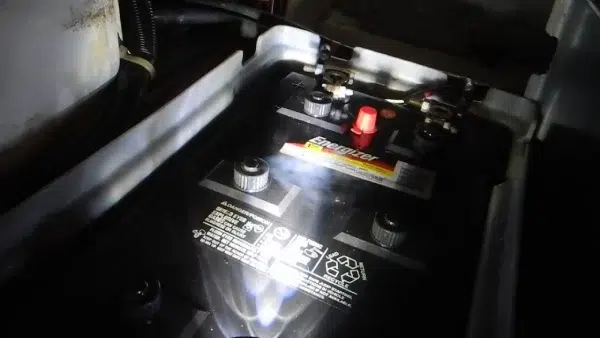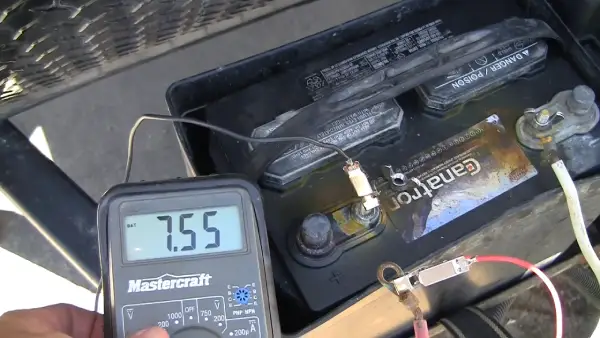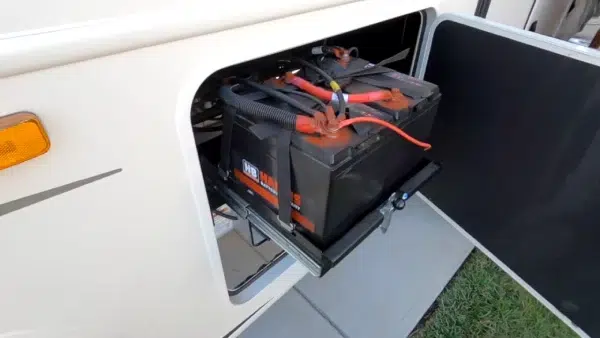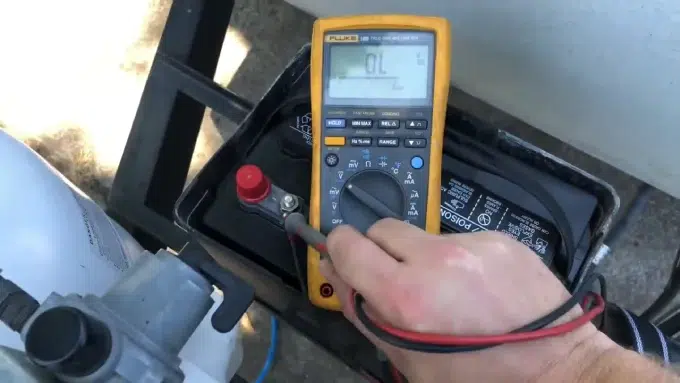Last Updated on May 1, 2023
Have you ever noticed a pungent smell near your RV battery or noticed the battery case melting or deforming? These are all signs of a boiling RV battery, which causes inconvenience and poses a safety hazard.
Understanding why your RV battery is boiling is crucial for preserving the longevity of your battery and avoiding any electrical system issues while on the road. Overcharging, exposure to high temperatures, low electrolyte levels, and age are some of the most important reasons why your RV battery is boiling.
Just Read on. From what causes the boiling to how to prevent it, we’ve got all the info you need so your power source doesn’t turn into a ticking time bomb.
Why Is My RV Battery Boiling: 4 Common Reasons
Boiling RV batteries can be a common problem for RV owners, and there are several reasons why this might happen. Here are a few of the most popular.
Overcharging the RV Battery
Overcharging the RV battery can be a major cause of boiling. An overcharged battery produces excessive heat, which can lead to boiling. This happens when the battery receives more voltage than it can handle, causing the electrolyte solution inside to heat up and evaporate.
Overcharging can also cause damage to the internal structure of the battery, leading to a shorter lifespan.
High Temperature and Heat Exposure
High temperature and heat exposure are some of the most common reasons for RV battery boiling. When the battery is exposed to high temperatures, it can cause the electrolyte solution inside the battery to evaporate, reducing the water level.
This reduction in water level can cause the battery plates to become exposed, which can lead to overheating and eventually boiling.
One of the main causes of high temperature and heat exposure is leaving your RV parked in direct sunlight for extended periods.
The heat from the sun can quickly raise the temperature inside your RV, causing your battery to overheat. Additionally, if you are using your RV during the hot summer months, this can also contribute to high temperatures and heat exposure.
Low Electrolyte Levels in the Battery
Low electrolyte levels are among RV battery boiling’s main causes. The electrolyte is a mixture of water and sulfuric acid that helps conduct electricity in the battery. Overheating and boiling can occur when the electrolyte level drops below the minimum required level.
Low electrolyte levels can be caused by various factors, including excessive use or charging of the battery or simply neglecting to check and maintain proper levels. In addition, extreme temperatures can also cause evaporation of the electrolyte.
Age and Wear on the RV Battery
One of the main reasons for this is age and wear on the RV battery. As batteries age, their internal components begin to break down and degrade. This can cause the battery to become less efficient at storing and releasing energy. Over time, this inefficiency can lead to excess heat buildup within the battery.
Another factor that contributes to battery aging is repeated charging and discharging cycles. Charging and discharging your RV battery, its internal components undergo stress and strain. Over time, this stress can cause the battery to lose capacity and become less effective at holding a charge.
Signs of a Boiling RV Battery

Boiling RV batteries can be a serious issue for any RV owner. Not only can it cause damage to your battery, but it can also lead to hazardous situations. Therefore, it is important to know the signs of a boiling RV battery so that you can take action before any further damage is done.
Pungent Smell near the Battery
A pungent smell near the battery indicates that your RV battery may be boiling. An overcharged battery or low electrolyte levels often cause this. When a battery is overcharged, it generates excessive heat, which can cause the electrolyte solution to boil and evaporate, resulting in a pungent smell.
It is important to note that this smell can harm your health and should not be ignored. If you notice this smell, it is recommended that you turn off any electrical appliances and remove yourself from the area until the source of the smell has been identified.
In addition to the pungent smell, other signs of a boiling RV battery include the casing melting or deforming and the corroding or rusting terminals. These signs indicate that your battery has been exposed to high temperatures for prolonged periods and may need to be replaced.
Melting or Deforming of the Battery Case
One of the most alarming signs that your RV battery is boiling is when you notice that the battery case is melting or deforming. This can be a serious safety issue, leading to leaks and even explosions.
There are several reasons why this may happen. One common cause is overcharging, which can cause the battery to heat up and melt. Another possible reason is exposure to high temperatures, which can also cause the battery to deform.
If your RV battery case is melting or deforming, it’s important to take action immediately. First, make sure that you turn off any power sources connected to the battery and remove them from your RV. Then, carefully inspect the battery for any signs of damage or leaks.
In some cases, you may be able to salvage the battery by replacing the damaged parts or cleaning up any leaks. However, in many cases, it’s best to replace the entire battery to ensure it doesn’t pose a safety risk.
Presence of Corrosion and Rust on Terminals
Corrosion and rust on the terminals of your RV battery can be a sign of a bigger problem that could lead to boiling. The buildup of corrosion and rust can interfere with the flow of electricity, causing the battery to overheat and potentially boil.
The corrosion and rust present on your RV battery terminals are usually caused by exposure to moisture or humidity. This can happen when you leave your RV in storage for an extended period or when you park it in an area with high humidity levels.
Corrosion can also occur due to a chemical reaction between the battery acid and the metal terminals.
It’s essential to regularly check your RV battery terminals for any signs of corrosion or rust. You can do this by inspecting them visually for any discoloration, buildup, or flaking. If you notice any of these signs, it’s best to clean them immediately using a mixture of baking soda and water.
How to Prevent an RV Battery from Boiling?

Proper maintenance and charging techniques are essential to prevent an RV battery from boiling. Overcharging, high temperatures, low electrolyte levels, and age and wear on the battery can all contribute to this problem. Here are some tips to help you avoid a boiling RV battery:
Proper Charging Techniques for Your RV Battery
One of the most common reasons why an RV battery boils is overcharging. Overcharging occurs when a battery receives too much charge, causing it to heat up and boil. This can damage the battery and even pose a safety hazard. Therefore, it’s crucial to use a proper RV battery charging technique.
The first thing you need to do is ensure that your charger is compatible with your RV battery. Using the wrong charger can result in overcharging or undercharging, which can cause problems for your battery. Check the specifications of your RV battery and charger before using them together.
Next, ensure you use the correct charging mode for your RV battery. Different charging modes, such as trickle, float, and bulk, are available.
Each mode has its own advantages and disadvantages depending on the type of battery you have. Consult your owner’s manual or contact the manufacturer to determine which mode is best suited for your RV battery.
It’s also essential to monitor the voltage level of your RV battery during charging. A voltage meter will help you track how much charge your battery receives, ensuring that it doesn’t overcharge. Once your battery reaches full charge, disconnect it from the charger immediately.
Another important factor in proper charging techniques is timing. Avoid leaving your RV battery connected to a charger for an extended period, as this can cause damage due to overheating or overcharging.
Regular Inspection and Maintenance of your RV battery
Regular RV battery inspection and maintenance are crucial for preventing it from boiling. Neglecting your battery can lead to a shortened lifespan and even dangerous situations.
One important aspect of maintaining your RV battery is checking its electrolyte levels regularly. Electrolytes consist of water and sulfuric acid that powers the chemical reaction in the battery, producing electricity.
If the electrolyte levels are low, it can cause the battery to overheat and boil. To check the levels, remove the caps on the battery cells and ensure the plates inside are fully submerged in liquid. If they’re not, add distilled water until they are.
Another important factor in maintaining your RV battery is keeping it clean and free from corrosion. Corrosion can build up on the battery’s terminals, impeding its ability to charge properly.
Use a wire brush or terminal cleaner to remove any buildup on the terminals, being careful not to touch both terminals with metal at once, as this could create a short circuit.
It’s also important to monitor how much power your RV battery uses so you don’t drain it too much. When you’re not using your RV, disconnect any accessories or appliances that might be draining power from your batteries. This will help extend their lifespan.
Finally, consider upgrading to a higher-quality RV battery if you find that yours isn’t holding up as well as you’d like. A better quality battery will have longer life spans and be less prone to boiling due to overcharging or overheating.
Upgrading to a Better Quality RV battery
When it comes to RV batteries, not all are created equal. Upgrading to a better-quality RV battery can significantly reduce the risk of boiling and other issues that arise from using a subpar battery.
One factor to consider when upgrading is the type of battery. Lead-acid batteries are the most common type used in RVs, but they require regular maintenance and can be more prone to boiling. Lithium-ion batteries, on the other hand, are more expensive upfront but require less maintenance and have a longer lifespan.
Another factor to consider is the capacity of the battery. A higher-capacity battery will provide more power for longer periods, reducing the need for frequent charging and potentially overcharging.
Choosing a reputable brand when upgrading your RV battery is also important. Look for brands with a proven track record of quality and reliability in the industry.
Should the RV battery be hot?

RV batteries should not be hot. If an RV battery feels hot to the touch, it could be a sign that it has been overcharged, which can damage the battery and shorten its lifespan.
Overcharging can also cause the battery to leak, potentially becoming a safety hazard. If you notice that your RV battery is hot, it is best to have it inspected by a professional to determine the cause of the issue and prevent any further damage.
Why is my RV battery bubbling when charging?
Due to electrolysis, RV batteries may bubble or emit gases during charging, breaking water down into hydrogen and oxygen gas. While some bubbling is normal during the charging process, excessive splashing or gassing can indicate a potential battery or charging system issue.
Overcharging can cause an increase in gas production, which can ultimately damage the battery. Monitoring the charging process and ensuring the charging system works correctly is important.
If you notice excessive bubbling or have concerns about your battery or charging system, it is recommended to consult a professional for further assistance.
What temperature does battery acid boil?
Battery acid, typically a solution of sulfuric acid in the water, has a boiling point of around 337 degrees Celsius (639 degrees Fahrenheit) at standard atmospheric pressure.
However, it is essential to note that battery acid should never be heated to boiling, as it can release dangerous fumes and potentially cause the battery to rupture or explode. Therefore, extreme caution should be taken when handling and disposing of battery acid.
Prep Your RV Battery for the Perfect Road Trip
As we have seen, RV battery boiling can occur for various reasons, including overcharging, high-temperature exposure, low electrolyte levels, and battery age and wear. Identifying these signs and understanding the preventive measures necessary to avoid a boiling RV battery is essential.
Proper charging techniques, regular inspection and maintenance, and upgrading to a better quality RV battery are all great ways to prevent battery boiling and ensure a safe and comfortable journey on the road.
These tips allow you to enjoy road trips without worrying about RV battery-related issues. Remember to keep your battery in top condition to avoid any hazards on your next adventure.



